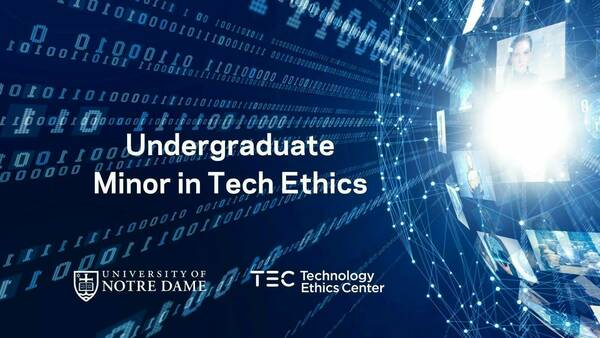
What are the ethical responsibilities associated with developing artificial intelligence systems? What about the moral obligations of the companies and other entities that subsequently use those AI systems to automate aspects of their work? How do we address and prevent bias in decisions made by computers?
Or take the many and ever-expanding ways our lives are lived online. Can we do anything to fight mis- and disinformation? How much privacy should we expect in exchange for the convenience of online transactions? What do institutions owe us when it comes to protecting our data?
Already topics of national and international conversation, technology ethics questions such as these have only grown more pressing over the course of the pandemic, which has heightened our real-world dependence on our virtual existence, both personally and professionally.
To give students a firm foundation in these issues, the Notre Dame Technology Ethics Center (ND TEC) has created an undergraduate minor in technology ethics, a course of study with applications in all manner of careers and that will be relevant to whatever ways students interact with and think about technology.
“Much of what we do at ND TEC proceeds from the basic idea that it’s not enough to ask whether a new technology can be developed,” said Kirsten Martin, ND TEC director, William P. and Hazel B. White Center Professor of Technology Ethics, and a professor of IT, analytics, and operations. “We also have to examine whether a given piece of technology—a social media algorithm that pushes specific types of content, the latest facial recognition software, etc.—should be developed, and if so, what the appropriate uses are. Students who pursue the undergraduate minor in tech ethics will be prepared to tackle emerging issues in a responsible and meaningful way.”
“Technological advances have enormous potential to improve individual lives, increase the general welfare, improve quality of life, and reverse environmental degradation,” added Warren von Eschenbach, ND TEC’s associate director for academic affairs. “But achieving these goods isn’t a given. Rather, it requires that the development and application of new technologies be subject to ethical analysis and integration.
“As Pope Francis has noted, ‘The indisputable benefit that humanity will be able to draw from technological progress depends on the degree to which the new possibilities at our disposal are employed in an ethical manner.’ This is the work in which we hope to engage Notre Dame students so that they might become leaders in the ethical development of technology.”
The undergraduate minor in tech ethics, which was approved by the University’s Academic Council to formally launch in fall 2022, is open to students from all colleges and schools at Notre Dame and consists of five courses/15 credits.
It begins with a required gateway class, “Fundamentals of Technology Ethics and Society,” and also features an advanced seminar on a current issue in tech ethics. Representative electives include courses like “Algorithms, Data, and Society,” “Application, Ethics, and Governance of AI,” “Ethics of Data Analytics,” “Ethics of Emerging Weapon Technologies,” “Future of Labor,” “Race and Technologies of Surveillance,” and “Robot Ethics.”
Classes are taught by faculty members from various disciplines, but especially those from the College of Arts and Letters, College of Engineering, Mendoza College of Business, and Keough School for Global Affairs.
For more information about the undergraduate minor, visit techethics.nd.edu/education/tech-ethics-minor/.
ND TEC was established in 2019 to advance interdisciplinary research and education concerned with the impact of technology on humanity. The center connects some 30 faculty from more than a dozen academic units at Notre Dame who explore enduring and emerging ethical questions in a wide range of technological contexts and from a variety of different disciplinary backgrounds and perspectives. These faculty are united by the belief that technology should promote human flourishing and that ethical considerations must be integrated into every stage of the development of technology and social, political, and cultural engagement with it.